The Long Read - The murky waters of the Laskaridis shipping empire
Outside Greece, the shipping businesses of the Laskaridis brothers have been caught engaging in controversial and polluting practices while using flags of convenience.
The investigation was initially published at Reporters United. Authors: Thodoris Chondrogiannos/Nikolas Leontopoulos. English version’s editor: Georgia Nakou. Read the Greek version here.
The Laskaridis brothers are pillars of the Greek shipping establishment. Their charitable foundations sponsor beach clean-ups, Greek heritage projects and the Greek navy. Outside Greece, their shipping businesses have been caught engaging in controversial and polluting practices while using flags of convenience.
The Laskaridis brothers are at the forefront of a generation of Greek entrepreneurs, renowned for their philanthropic activities in their home country, as well as for a business portfolio which ranges from shipping to landmark hotels and casinos.
While the brothers are keen to present themselves as a Greek success story, an investigation by Reporters United shows that outside Greece, their shipping businesses have come under scrutiny for their poor record of compliance with international environmental, safety and labour regulations, as well as in connection with a number of serious incidents at sea.
Using publicly-available information from a variety of open sources, Reporters United set out to balance the record – but found the family reluctant to cooperate.
Meteoric rise
Panos and Thanasis Laskaridis have succeeded in building a remarkable business empire in the space of a few decades, starting from a small fishing fleet inherited in the 1970s. While not quite the rags-to-riches story of more familiar post-war figures like Aristotle Onassis and his rival Stavros Niarchos, the meteoric rise of the Laskaridis brothers is seen as an embodiment of the Greek entrepreneurial spirit and the Greek shipping tradition.
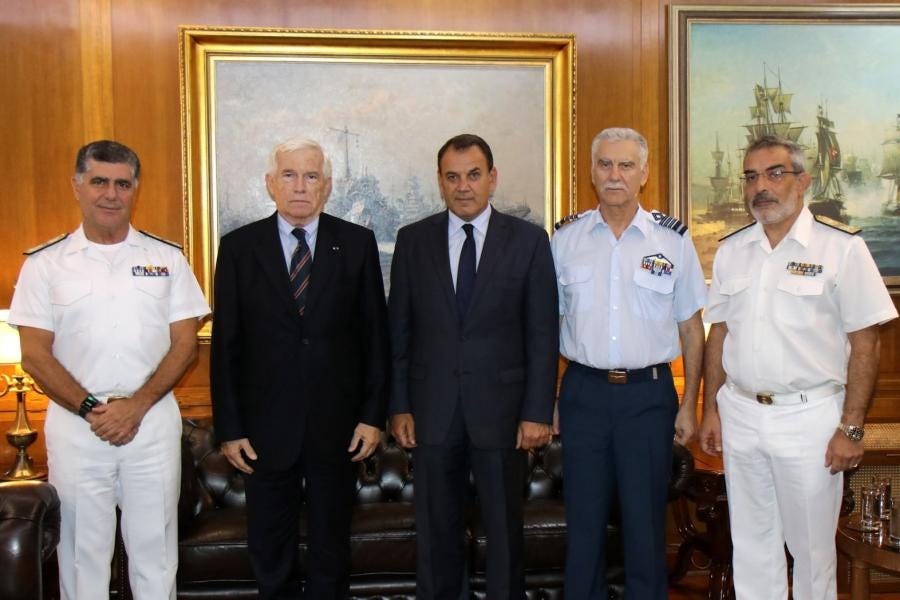
Starting out with five fishing boats, they now control over 70 vessels, including one of the largest fishing fleets in the world, numerous oil tankers and dry bulk carriers, as well as ship repair facilities and marine terminals. The Laskaridis brothers also control two of the most historic hotels in Athens, the Grande Bretagne and the King George, both overlooking Syntagma Square and the Greek Parliament, casinos and a minority shareholding in Aegean Airlines.
Panos Laskaridis has served as a board member of the Union of Greek Shipowners (UGS), and as president of the ECSA (the European Community Shipowners’ Association).
Greek shipping represents 54% of the EU and 21% of the world deadweight capacity according to the UGS website, making the Greek merchant fleet the largest in the world, a presence way out of proportion to the size of the country’s economy and its influence on the world stage. It is no surprise that Greeks are proud of punching above their weight in the sector, an achievement which is seen as a worthy continuation of the nation’s ancient maritime heritage.
The size of the Greek shipping sector’s contribution to the domestic economy came under renewed scrutiny by Greece’s lenders and the foreign media particularly during the country’s economic crisis. The Laskaridis brothers, like other shipping families, are keen to be seen to “give back” to their birth country, particularly in the form of high-profile philanthropy conducted through charitable foundations.
Charitable activities
Thanasis Laskaridis told Kathimerini newspaper in a 2020 interview, “the haves need to step up”. The Laskaridis family’s philanthropic activities are well-publicised. Through Panos Laskaridis’s Aikaterini Laskaridis Foundation (ALF) (named after their mother) and the Athanassios C. Laskaridis Charitable Foundation (ACLCF), the brothers have funded a multitude of charitable initiatives in specific areas of interest.
The ALF focusses on educational contributions, funding libraries and research projects, including the ongoing excavations on the Antikythera wreck and the restoration and study of the Antikythera mechanism, one of the most famous surviving examples of ancient Greek technology.
Panos Laskaridis takes a strong and active interest in national issues, contributing a series of hawkish op-eds in the Greek press in recent years on the subject of Greek-Turkish relations. The businessman has also made donations in kind to the Hellenic Navy, including two support vessels and a training vessel – a private donation to national defence without obvious parallels in a modern European democracy – for which he was made an honorary rear admiral and awarded a military medal by the Greek government.
His brother Thanasis’s foundation sponsors social and environmental initiatives, including the SeaChange Greek Islands programme which focuses on “the protection of the marine environment” through educational series and volunteer activities such as beach clean-ups. These activities also enjoy the blessing of the Greek government – in May 2020, then Environment Minister Costis Chatzidakis launched the foundation’s campaign against single-use plastics, which he said would “culminate in legislation” (law 4736/2020 passed later that year was in fact the transposition of EU Directive 2019/902/EU into Greek law).
The Laskaridis brothers’ charitable activities are the public face of the family in Greece. Through them, and their prominent coverage in the domestic press, they are seen as successful representatives of Greek shipping prowess, defenders of the national interests and champions of environmental causes.
How accurate a reflection is this of the Laskaridis brothers’ business activities? Our investigation, which relied on publicly-available information from a variety of official sources, found a picture at odds with the family’s public image. On two occasions we gave the family the opportunity to respond to our findings but found them reluctant to cooperate.
Flags of convenience
In our searches of international shipping and company registers we struggled to find any kind of connection between the Laskaridis brothers’ business interests and their home country.
We approached the Laskaridis brothers in advance of publication with a list of questions relating to their businesses. The Head Legal Council of Laskaridis Shipping Company Ltd. responded that “over the past thirty years, the diverse business activities of the family – headquartered in Greece, as is the shipping company – has created more than 6,000 new jobs in the country, making an important contribution to the national economy and contributing billions of euros to the Greek state”.
Neither Laskaridis Shipping Company Ltd nor the management company Lavinia Corporation Ltd. (Lavinia Corp), valued according to press reports at over 1 billion US Dollars, in which the brothers are joint CEOs, can be found on the Greek company register (G.E.MI.). According to the Global Legal Entity Identifier, both Laskaridis Shipping Company Ltd and Lavinia Corporation are registered in Liberia and fall under Liberian jurisdiction, even though both list an Athens address as their headquarters.
Our searches also failed to find a single ship in their fleet sailing under the Greek flag. In contrast our search of open data sources on ship ownership, revealed that more than 70 ships associated with the complex web of Laskaridis companies are under the flags of Panama, Liberia, Vanuatu and Malta – all of which meet the description in the literature, including that of the OECD, of “Flags of Convenience”. Find the list with the ships here.
Flags of convenience offer shipping companies favourable conditions which include lower wages, lower taxes, lighter regulatory checks on labour and environmental practices, and lower corporate disclosure standards, including the ability to operate through shell companies which conceal beneficial ownership.
Our research on ship ownership drew on the Equasis database (a public data source supported by the world’s major shipping nations including the EU, the UK, Japan, the USA, Norway and South Korea – but not Greece).
On the question of the use of Flags of Convenience the company’s response referred us to an earlier letter sent on behalf of Lavinia Corp by their legal representatives Hill & Dickinson to Greenpeace, and gave us permission to quote from it:
“The use of, so called, ‘flags of convenience’ is an industry standard practice in global shipping, driven by a complex range of commercial, legal and political factors. It is completely unsustainable to suggest that our clients’ participation in this practice is either (i) unusual or (ii) indicative of unlawful behaviour and/or exploitative business practices”.
Murky waters
Serious questions have also been raised about the Laskaridis family’s environmental credentials. A few months before the Greek government rushed to associate itself with the ACLCF’s anti-plastics campaign, Greenpeace published a report titled “Fishy Business” on the threat to the marine environment posed by the practice of “transhipment at sea”. The report gave pride of place to the Laskaridis fleet, which it described as the “the single most active fleet of reefers involved in transshipments on the high seas”, and went on to claim that, “many of [Panos Laskaridis’s] boats are reported to pose an environment risk”.
This is not the first run-in the Laskaridis family has had with the environmental organisation. A 2014 Greenpeace report, which named one of their vessels among the 20 most destructive in the EU, was rejected as “defamatory” by the Laskaridis Shipping company, who threatened legal action. The threat against Greenpeace never materialised. Τhe Laskaridis family has given us permission to quote extensively from their relevant correspondence with Greenpeace.
In fact, the Reporters United investigation backed up Greenpeace’s findings, revealing a poor safety record and the routine pursuit of environmentally damaging practices, as well as several major incidents at sea including an oil spill and a collision involving Laskaridis-controlled vessels. The businesses’ approach to these international incidents seems starkly at odds with the image of environmental champions the Laskaridis brothers seek to project at home.
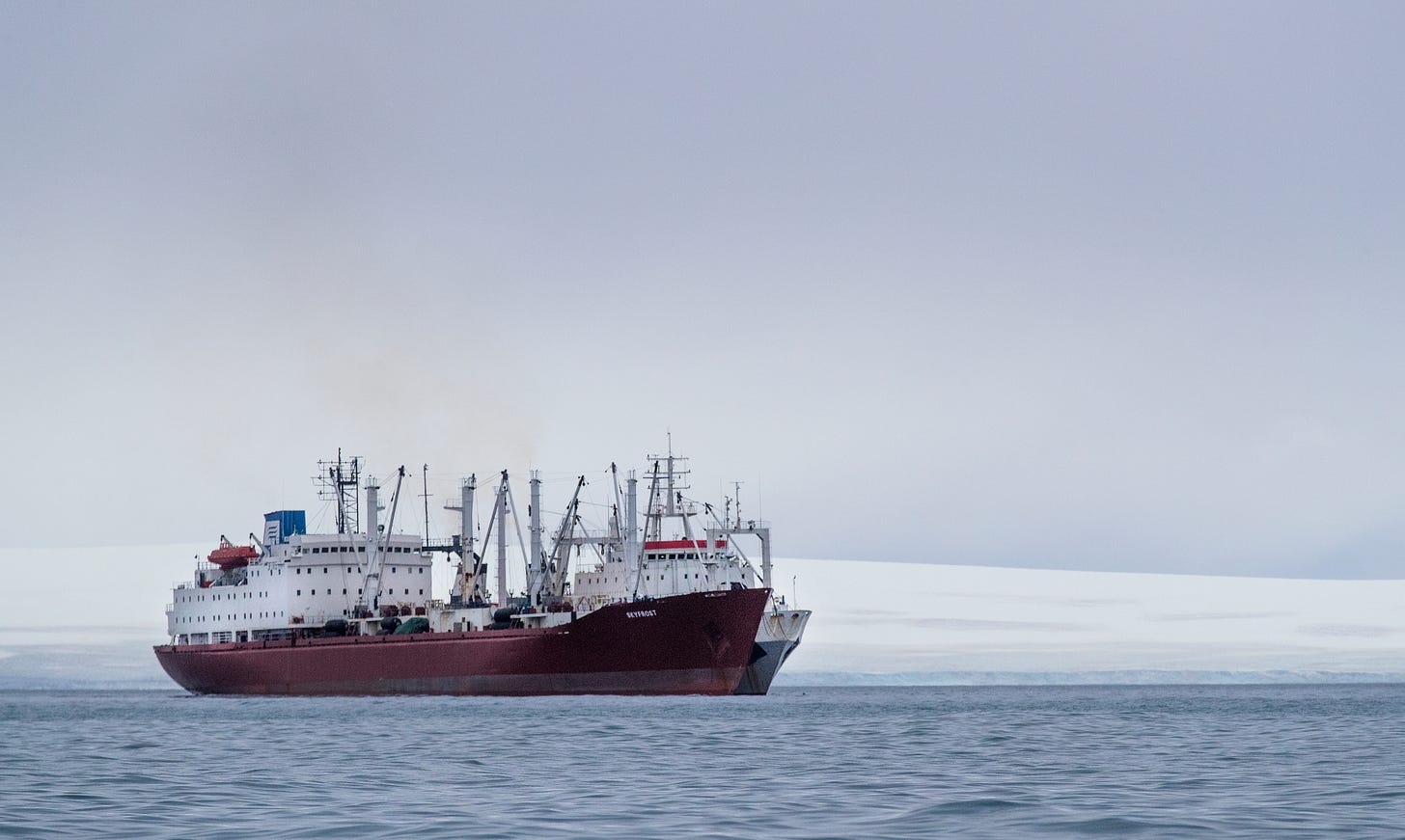
Detentions
Using the Equasis database, we were able to identify no fewer than 14 vessels controlled by the Laskaridis family (Zefyrοs Reefer, Aeolos, Frio Las Palmas, Proteas, Cool Girl, Pamyat Ilicha, Thisseas, Frio Oceanic, Idomeneas, Ariadne, Frio Shinano, Frio Athens, Frio Dolphin, Frio Hellenic) which were detained at port after registering serious deficiencies in port inspections. Port inspections are the means by which authorities monitor and enforce international shipping rules on safety and pollution. Detention is the ultimate sanction and is imposed on vessels essentially deemed too dangerous or unseaworthy. The detentions occurred at a number of ports across the world.
Map: Ports where ships connected to the Laskaridis family were detained
In its previous letter to Greenpeace, the Laskaridis family’s legal representatives defended their fleet’s safety record, claiming that:
“We are instructed that our clients PSC [Port State Control] record in all PSAC’s, in respect of both detentions and deficiencies is below the global industry average for Reefers, Bulkers and Tankers based on official PSC records”.
No statistics were provided in the correspondence to support this claim.
Reporters United also looked in greater detail at the safety history of a handful of vessels using publicly available information, each of which highlights specific practices. Our main source of information was the Equasis database.
Skyfrost and transhipment at sea
The Skyfrost was a reefer – a refrigerated cargo ship – which was part of the Laskaridis fleet between 2009 and 2020, when it was withdrawn from operation and sold for scrap before being broken up at a South Asian beach yard. The Skyfrost gained fame in shipping circles as one of the first vessels to cross the Arctic. However, it was also profiled by Greenpeace for its involvement in the environmentally dubious practice of transhipment at sea.
Transhipment at sea – the practice of offloading catch from one fishing vessel into another in the open sea – is integral to the industrial-scale fishing practiced by the Laskaridis companies. Environmental groups see it as providing a loophole in the monitoring of fishing activities, potentially allowing fishing fleets to evade international rules aimed at preventing overfishing.
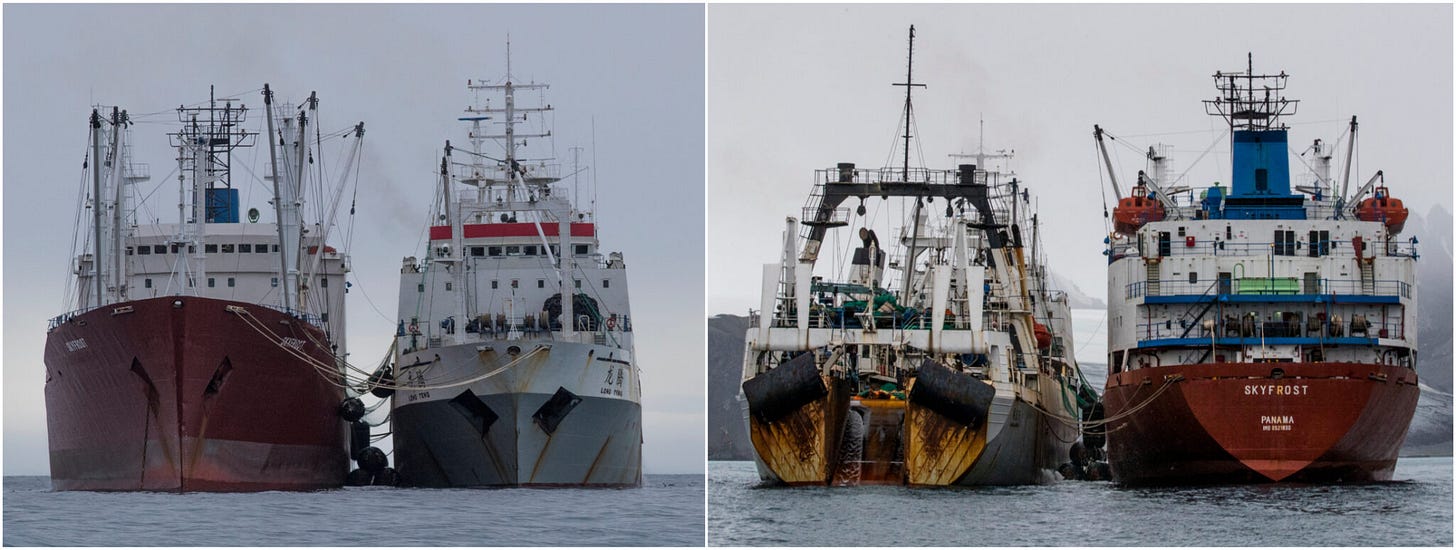
According to the response from the Laskaridis family’s legal representative, “[t]he practice of transhipping is completely legal and in no way equivalent to, or indicative of, unlawful or exploitative behaviour […] Our clients have performed many thousands of bunkering operations without a single environmental incident”.
According to records analysed in the Greenpeace report, the Laskaridis fleet of reefers, including the Skyfrost- have dominated transhipping in the waters protected by the CCAMLR Convention for the protection of Antarctic environment from pollution and overfishing – but also spend a lot of time in unregulated waters where transhipping is not monitored and illegal transhipping is known to take place.
Reporters United’s analysis of the Skyfrost’s safety record also revealed a chequered history. While the vessel was operated by the Laskaridis family it had 21 inspections at port, over half of which revealed at least one deficiency. The findings ranged from failing environmental regulations to failing safe navigation and fire regulations.
Proteas – held at port on three continents
The Proteas is a bulk carrier which has been operated continuously by the Laskaridis family since it was built in 2010.
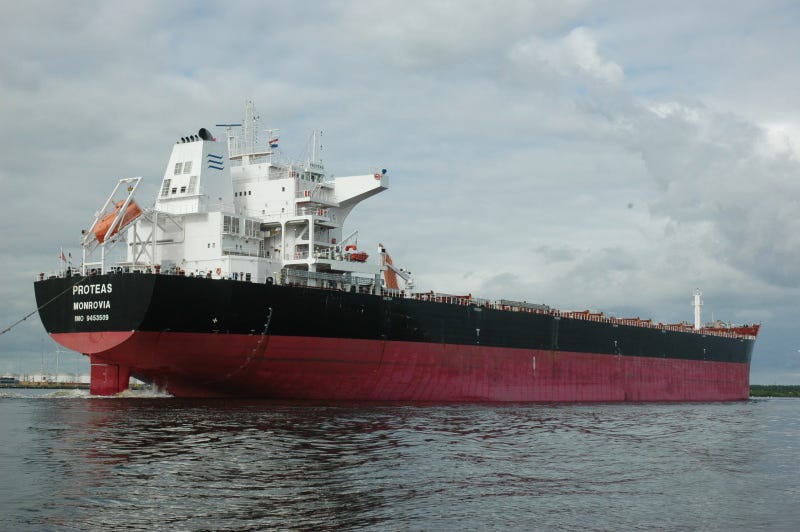
The Proteas came to our attention because of its exceptionally poor safety record, having failed 15 out of 28 inspections at port, many of which revealed double-digit numbers of deficiencies. Some of the deficiencies – ranging from safety failures to labour violations – were so serious that the boat was subjected to detention at port on four separate occasions in its ten-year history of operations, twice in Chinese ports, once in Brisbane and once in Hamburg.
The Laskaridis family did not respond to Reporters United’s enquiries regarding the Proteas.
Thisseas – prosecuted for “intentional pollution”
The Thisseas is another bulk carrier which has been operated continuously by the Laskaridis family since it was commissioned in 2012.
The Thisseas became infamous when it was intercepted by the French navy off the Brittany coast in February 2016, after it was caught on video from a French military airplane trailing an oil spill 43 km long and 50 m wide.
The Brest prosecutor accused the crew of “intentional pollution” as no damage to the vessel had been notified to the French authorities.
The French authorities imposed a fine of 1 million euros, however Liberia, under whose flag of convenience the Thisseas was sailing, claimed jurisdiction and lowered the fine to 160,000 US dollars. The decision is being appealed by the French courts.
The Thisseas was detained at port two months later after failing an inspection in a Chinese port, but otherwise had a relatively clean safety record, passing the majority of its 27 inspections.
The Laskaridis family declined to answer questions on the vessel on the grounds that the court case in France was still ongoing.
Uruguay Reefer – collision in the Antarctic
The Uruguay Reefer is – or rather was – a reefer built in 1993 and operated by the Laskaridis family between February 2015 and May 2017 when it sank after colliding with an ice floe in the CCAMLR Convention zone of the Antarctic.
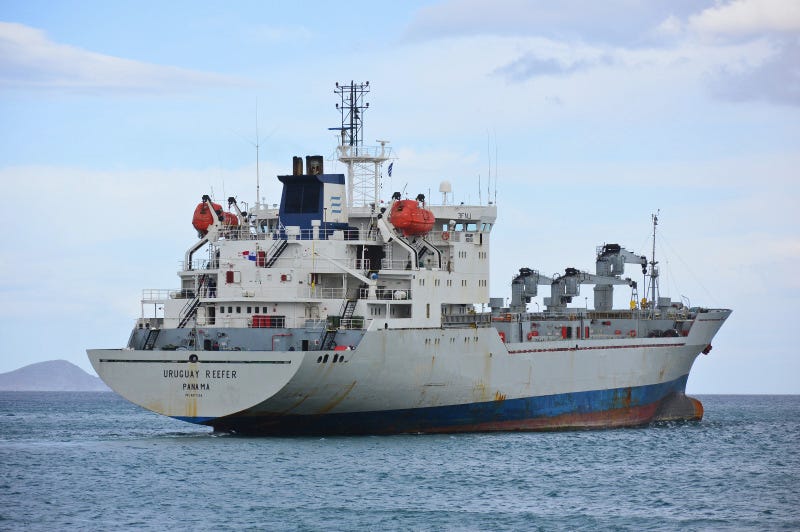
It was reported at the time that the Uruguay Reefer was carrying 560 tonnes of heavy fuel oil – a substance prohibited in the Antarctic – when it went down to a depth of 6,000 metres 350 nautical miles from the Falklands. It is fortunate that the boat sank outside the protected zone and it is unlikely that the conditions would allow a fuel leak.
In their letter to Greenpeace, the Laskaridis family deny that the reefer was carrying a prohibited fuel, claiming that it was instead carrying a lighter fuel approved for use in the Antarctic. They declined to comment further, claiming that the accident was the subject of an ongoing court case.
The last port inspection of the Uruguay Reefer prior to the accident took place at the port of Mersin in Turkey in October 2016 and identified 5 deficiencies. In just over two years as part of the Laskaridis fleet the vessel had deficiency findings in a third of its inspections.
Political connections
Aside from pursuing close connections to the Greek government through their charitable initiatives, it has on occasion been alleged that the Laskaridis brothers sought political influence through less transparent business dealings with senior political figures in Greece.
An investigation published by Documento newspaper in 2019 claimed to have found evidence suggesting that a Panamanian shell company with links to the Laskaridis family invested in a fashion business venture co-founded by the wife of then opposition leader and current Prime Minister Kyriakos Mitsotakis, Mareva Grabowski-Mitsotaki. The report claimed that the same company invested in the newspaper Proto Thema, whose editorial line traditionally supports Mitsotakis’s New Democracy party.
Reporters United approached the Laskaridis family for comment on the allegations prior to publishing this article, and received the following response:
“The Laskaridis family and the legal entities it controls always act in accordance with the law in all countries in which they pursue business activities. Therefore, anything concerning the family as natural or legal persons is declared to the tax authorities in the countries concerned. As a matter of course we do not respond to publications, nor do we participate in media organisations directly or indirectly, a fact which would in any case be obvious due to the legal obligation to disclose the names of shareholders in publishing businesses”.
The response concluded more ominously, stating that, “as we have noted that you persist in posing malicious questions with the intention of deceit, for reasons unknown to us at present, we inform you that we will defend our legal rights as natural and legal persons wherever necessary, in Greece and abroad, as well as our personal data”.
We also contacted Mareva Grabowski-Mitsotaki for comment on the story but have not received a response at the time of publication.




